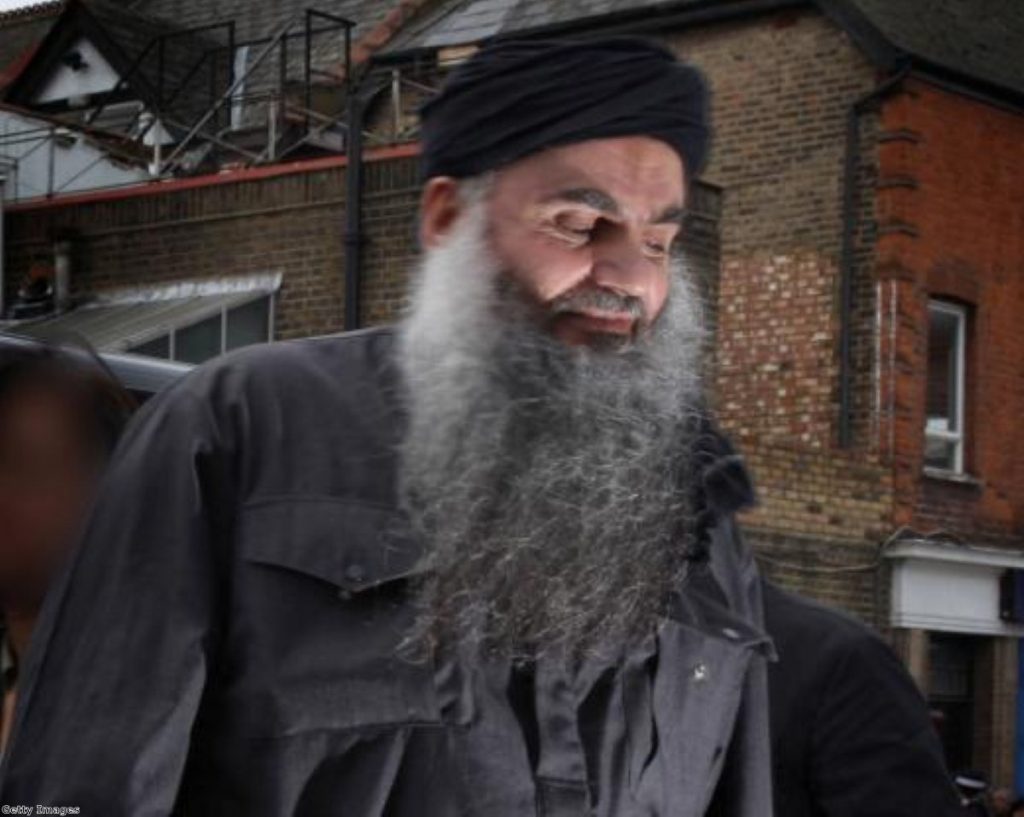Confusion reigns as No 10 toys with leaving ECHR over Qatada
The government's policy on leaving the European Convention of Human Rights (ECHR) was as clear as mud today, after reports emerged it was considering leaving only for Theresa May to underplay them.
In a confusing afternoon, it was reported David Cameron had decided to leave the convention in a fit of anger following the appeal court decision on Abu Qatada yesterday.
Such a move would be a remarkable development with possible far-reaching implications for Britain's international standing. It would be strenuously opposed by Liberal Democrats in government and some Tories.
Just before Theresa May was due to update MPs on the situation in the Commons this afternoon, numerous media reports said the UK was about to temporarily step back from the convention until it could deport Qatada – strongly suggesting a No 10 briefing operation.


The prime minister's spokesman confirmed it had been discussed in a meeting yesterday to which no Liberal Democrats were invited.
But when May stood up to address the Commons, she reported only that the UK had secured a new bilateral treaty with Jordan which should address concerns around the use of torture in the evidence presented during a trial of the radical cleric.
Even May refused to rule out a withdrawal from the ECHR, but the home secretary definitively underplayed it.
"We should have all options, including leaving altogether, on the table," she said.
The Home Office is also appealing against the Qatada ruling directly to the supreme court.
Moments later Ken Clarke took to the airwaves to pour cold water over the prospect of a withdrawal.
"It’s not the policy of this government to withdraw either from a short period or for a lengthy period from the European Convention on Human Rights," he told Radio 4.
Tory MP Mark Reckless, who called a point of order during the debate to complain of "personal abus"e because the home secretary tried to make a pun on his name, conducted a TV interview immediately after the session.
"While the home secretary seems intent on this craven surrender to Strasbourg, I think some of our judges are made of sterner stuff than that," he said.
"If you listen to what they've been saying, I think they are prepared to take a lead on this and say ultimately the European convention is now part of our law under Labour's Human Rights Act.
"What I hope will happen is that the supreme court will insists that it is the ultimate arbiter of these human rights act, because they are part of our domestic law. And if it decides on that basis Qatada can go, then he can go."
The prime minister told ministers yesterday that the radical cleric's continued presence in the UK made his "blood boil" and promptly called a meeting with May, justice secretary Chris Grayling and attorney-general Dominic Grieve.
During that meeting it appears he raised the prospect of temporarily withdrawing from the ECHR, probably by getting an exception to the Rule 39 injunction blocking Qatada's removal.
But any such move would be passionately opposed by Nick Clegg, who would veto it in his regular 'quad' meetings with the prime minister, George Osborne and Danny Alexander.
Clegg would also find support from Conservative minister without portfolio Ken Clarke and Grieve, both of whom could very well resign over the issue. The attorney-general has previously warned turning its back on the ECHR would turn Britain into a "pariah state", like Belarus.
The consequences of an attempted withdrawal therefore seem too severe for Cameron to contemplate, leading some commentators to ponder whether his fiery rhetoric is a sign he has simply lost his patience with the issue.
It is not the first time he has appeared visibly angry with an ECHR ruling. When it decided prisoners should have voting rights, the prime minister told MPs it made him "sick in the stomach".
But Cameron's involvement significantly raises the stakes in a legal battle which the government looks doomed to lose.
If Tory MPs feel the prime minister has marched them up the hill only to march them back down again – perhaps with a pledge to temporarily leave the ECHR in the Conservative general election manifesto – it could further erode his authority with his parliamentary party.
The row also increases the pressure on the prime minister to introduce tough new measures on deporting foreign criminals in the next Tory manifesto.
Last month the appeals court accepted the Special Immigration Appeals Commission ruling that Qatada could not be returned to Jordan, despite assurances he would not be tortured.
The court accepted those assurances, but feared evidence previously gained through torture could be used in the case.
The court of appeal accepted that ruling, saying the commission had not misinterpreted or misapplied the law.
Qatada was re-arrested last month for breaching his bail conditions concerning the use of electronic equipment at his home.












